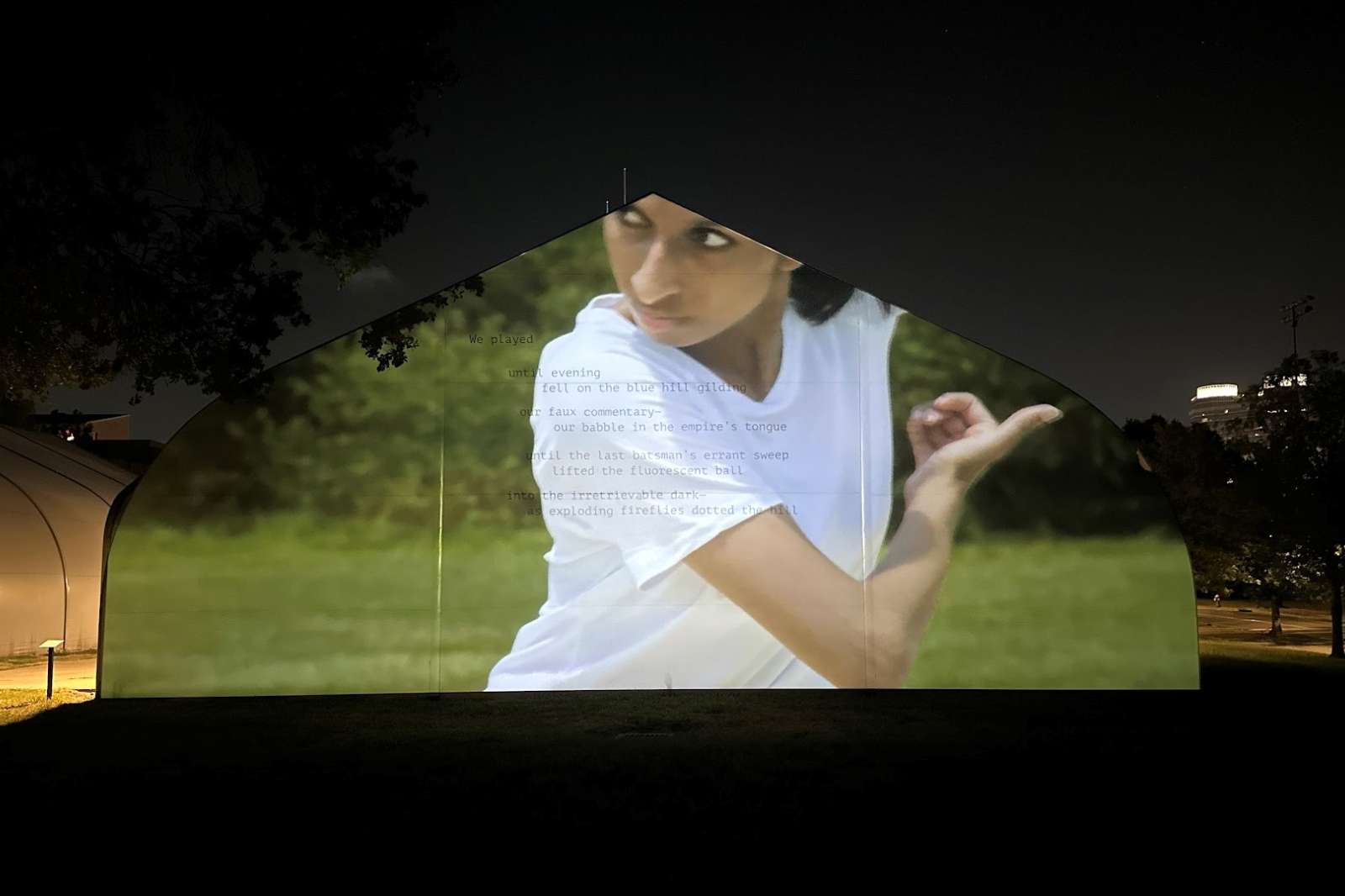Tent Series: Rajgariah, Tam, and Welch
2024 Academic Year | Temporary Installations on PCF Tents
As in the past three rounds of commissions for the Tent Series, artists were invited to respond to the current moment and the campus environment with interventions intended to foster conversation in the academic year ahead. Works by Preetika Rajgariah, Kenneth Tam, and Sarah Welch will be featured on the south side of campus, across Loop Road from Herring Hall, from August 21, 2023, through May 15, 2024. These works follow Tent Series commissions from Karin Broker, GONZO247, Robert Hodge, Allison Hunter, Hedwige Jacobs, Delita Martin, Royal Sumikat, Charisse Pearlina Weston, and Jasmine Zelaya. Read on to learn more about each artwork.
Preetika Rajgariah, your potential self is infinite, 2023
Vinyl. Original work, acrylic and latex paint, saris on yoga mats.
Incorporating a range of materials from yoga mats to family-owned saris, Preetika Rajgariah’s practice examines the intersections of identity, race, pop culture, and sexuality. In her vibrant paintings, dynamic installations, and engaging performances, the artist explores contemporary selfhood through material histories of the body and various cultural narratives.
In your potential self is infinite, Rajgariah used five vertical yoga mats as canvases. Upon this textured surface, she painted and collaged three self-portraits in poses based on Bharatanatyam, a traditional Indian dance. To make the monumental figures and create depth, the artist layered strips of patterned fabric, specifically fragments of saris sourced from her mother and the local thrift store. In the background, lights sparkle amongst dark green foliage, while neon blue lines shaped like portals reference the British reality dating television show, Love Island. A large neon heart near the center of the scene invokes sentimental and saccharine notions of love as depicted in the media while gesturing to the artist’s personal desire to reclaim a space for self-love.
In Rajgariah’s words, “It’s a message of self-love to all the women on campus, especially those who look like me.” As with many of her works, the title comes from the label on a Yogi teabag, an American brand of tea that features inspirational affirmations on every tag. Such a reference simultaneously offers an uplifting message of self-empowerment while considering the multi-faceted aspects of identity and the commercialization of culture.
This installation is organized by Molly Everett, Assistant Curator, and is made possible by Rice University’s Arts Initiative Fund and the Moody Center for the Arts.
Kenneth Tam, We played, 2023
HD video and vinyl, on view from sunset to sunrise.
Dance, Jeevika Bhat; choreography, Juri Onuki; videography, Christian Carroll
Poem We Played (2023) by Rohan Chhetri.
Kenneth Tam is a visual artist whose practice investigates codified behaviors within groups, often in the context of universities, schools, or sports. He captures gender-specific rituals that are adopted to forge or affirm identity but also reveal unlikely moments of intimacy or even vulnerability. As Tam observes bodily expressions and collective activities in staged situations, he highlights the potential of the human body to function as a catalyst for social change by engaging in communication and relationships with others.
In We played, Tam examines the game of cricket as a carrier of cultural memory and a participative practice that can generate a feeling of belonging. He was inspired by growing South Asian cricket communities in Houston and nearby Fort Bend County, which is one of the most diverse counties in the United States. Tam worked with a professional dancer of South Asian descent to film a sequence of movements inspired by the actions of cricket players, particularly by the batter and the bowler (the person who throws the ball). This physical engagement is translated into a poetic, dance-like suite of abstracted gestures.
Tam collaborated with the Houston-based poet Rohan Chhetri who created a new text, reproduced on the tent’s surface. The shape of the poem is meant to suggest the curve of the ball, or its arc when thrown by the bowler. In the poem, Chhetri reflects on how cricket speaks to questions of immigration and diasporic identity, as mirrored by the movement of the body. At night, the moving images and the printed words blend into each other, emphasizing the inspirational power of the visual arts, sports, and poetry.
This installation is organized by Frauke V. Josenhans, Curator, and is made possible by the Moody Center for the Arts.
Sarah Welch, Skeeter Control, 2023
Vinyl. Original work, ink on paper.
Artist and illustrator Sarah Welch creates images, installations, and zines exploring the real and speculative effects of climate change on the Gulf Coast. Working at the intersection of nature and the built environment, Welch draws attention to the impact of human activity on the changing planet and our everyday lives.
Drawn in the artist’s signature style of black outlines filled with hues of green, Skeeter Control depicts a cross-section of a frog pond with tadpoles in various stages of development. At the center of the composition, an aerosol spray can of bug repellant has fallen into the pond. The can’s label references a product developed by Gulf Oil in the late 1950s, made with the toxic chemical DDT (dichloro-diphenyl-trichloroethane), the first synthetic insecticide. The label’s design acknowledges both the product’s success as a means of pest control and its adverse environmental impact on wildlife and human health. Although DDT was banned by the Environmental Protection Agency in 1972, its impact continues to be felt in natural habitats along the Gulf Coast and around the world.
Reflecting on the work the artist stated, “I like the contrast between a frog pond, which you could say is its own form of mosquito control, and the chemical bug spray as a human-engineered tool of control.”
This installation is organized by Alison Weaver, Suzanne Deal Booth Executive Director, and is made possible by the Moody Center for the Arts.









